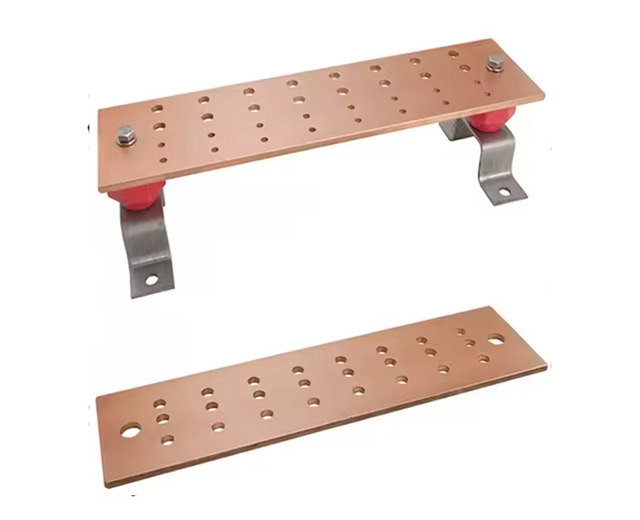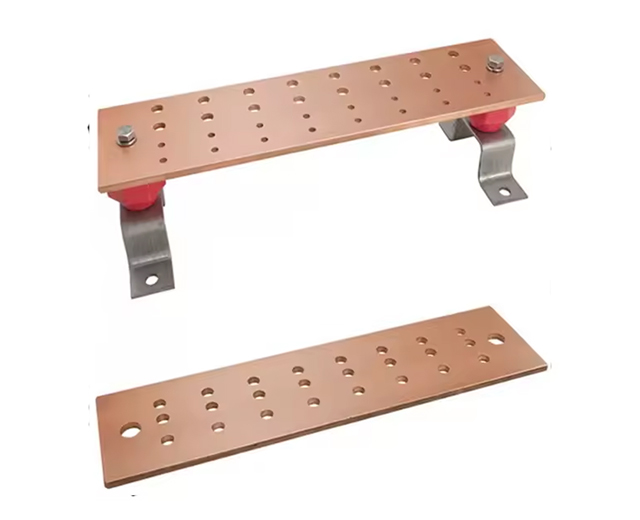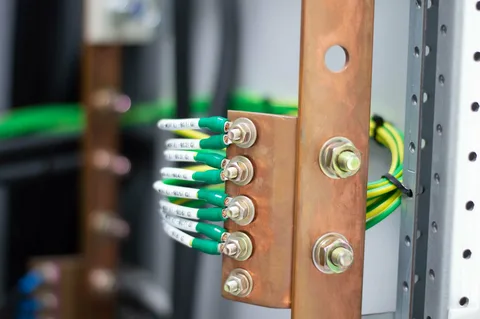

An electrical Ground Bus Bar is a conductive metal bar, typically made of copper or aluminum, used to safely distribute grounding in electrical panels and power systems. It ensures that all equipment and electrical circuits are properly earthed, reducing the risk of electric shock and protecting sensitive devices. Commonly seen as ground bus bar electrical panel components, they provide a reliable path to the earth for electrical currents. High-quality copper grounding bus bar or electrical copper bus bar products ensure low resistance, high durability, and compliance with international safety standards.

The electrical ground bus bar manufacturing process involves several precise steps:
Material Selection – High-purity copper or tin-plated aluminum is chosen for conductivity and corrosion resistance.
Cutting & Shaping – Bars are cut to required lengths and widths using CNC or laser machines.
Drilling & Punching – Holes are drilled for secure mounting in electrical panels.
Surface Treatment – Tin plating or oxidation protection is applied to prevent corrosion. (Keyword: how to protect copper from oxidizing for electrical bus bars)
Inspection & Testing – Conductivity, dimensional accuracy, and mechanical strength are tested to ensure performance.
This bus bar electrical ground fabrication ensures a durable, reliable grounding solution suitable for various industrial and commercial applications.

Electrical ground bus bars are widely applied in:
Power Distribution Panels – Serving as the main grounding point in industrial and commercial buildings.
Switchgear and Control Cabinets – Providing safe grounding for high-current devices.
Renewable Energy Systems – Grounding for solar inverters and wind turbines.
Data Centers & UPS Systems – Ensuring stable operation and protection of sensitive electronics.
Automotive & EV Charging Stations – Using copper electrical bus bars to safely handle high current.
High Conductivity – Copper materials reduce resistance and energy loss.
Durability – Tin plating and corrosion-resistant coatings extend lifespan.
Safety – Ensures reliable grounding in compliance with electrical codes.
Compact Design – Fits neatly into panels and cabinets.
Customizable – Available in different widths, thicknesses, and lengths.
Low Maintenance – Minimal upkeep required with proper installation and protection.
Compared to standard suppliers, our copper grounding bus bar offers superior plating quality, precision drilling, and long-term oxidation resistance.
When designing a ground bus bar electrical panel:
Calculate required current carrying capacity and choose appropriate copper electrical bus bars cross-section.
Determine placement in the panel for optimal grounding paths.
Select proper surface treatment (tin plating or epoxy coating) to prevent oxidation.
Ensure mechanical support and secure mounting to prevent vibration or loosening.
| Parameter | Specification Range | Notes |
|---|---|---|
| Material | Copper, Tin-Plated Aluminum | High conductivity and corrosion resistance |
| Width | 10 mm – 100 mm | Customizable based on panel size |
| Thickness | 2 mm – 20 mm | Depends on current requirements |
| Length | 100 mm – 2000 mm | Can be cut to customer specifications |
| Current Capacity | 50 A – 3000 A | Based on cross-section and installation |
| Surface Treatment | Tin plating, Nickel plating, Oxidation-resistant coating | Protects against corrosion |
| Operating Temperature | -40°C to +125°C | Suitable for industrial and outdoor use |
Always tighten connections to the manufacturer’s recommended torque.
Avoid physical damage and ensure the bus bar is mounted flat against the panel.
For copper bus bars, follow how to protect copper from oxidizing for electrical bus bars instructions.
Inspect periodically for signs of corrosion or loosening.
Clean using non-abrasive materials and approved solvents.
Choosing the G and N Fortune Limited Electrical Ground Bus Bar ensures you receive premium quality, reliability, and expert support for all your power distribution needs:
High-Quality Materials – Made from high-conductivity copper or tin-plated aluminum, providing excellent performance and corrosion resistance.
Advanced Manufacturing Process – Our electrical ground bus bar manufacturing process includes precise cutting, drilling, bending, and surface treatment to guarantee accuracy and durability.
Customization Options – Width, thickness, length, and surface finishes are fully customizable to fit any panel or installation.
Global Supply & Timely Delivery – Trusted copper grounding bus bar supplier with reliable shipping for international B2B clients.
Expert Technical Support – Guidance on design, installation, and maintenance of bus bar electrical ground systems.
Long-Term Reliability – Reduced oxidation and wear ensures safety and longevity in industrial, commercial, and renewable energy applications.
By choosing us, you are partnering with a professional manufacturer committed to high standards, technical expertise, and customer satisfaction, making our electrical ground bus bar superior to standard suppliers.
Q1: What is an electrical ground bus bar used for?
It provides a safe path to the ground, preventing electrical hazards and protecting equipment in panels and control systems.
Q2: What is the difference between copper and tin-plated aluminum ground bus bars?
Copper offers higher conductivity and durability, while tin-plated aluminum is lighter and corrosion-resistant.
Q3: How do I protect copper from oxidizing for electrical bus bars?
Use tin plating, epoxy coating, or regular maintenance with approved anti-oxidation agents.
Q4: Can ground bus bars be customized?
Yes, we offer custom widths, thicknesses, lengths, and surface finishes.
Q5: Where to buy copper grounding bus bar?
You can purchase directly from us as a reliable electrical ground bus bar manufacturer with global shipping.
Q6: Can electrical copper bus bars be used in battery systems?
Yes, they are widely used in copper electrical bus bars for EVs and renewable energy battery packs.